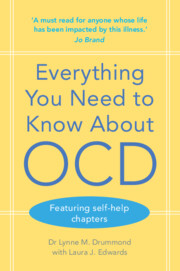Book contents
- Everything You Need to Know about OCD
- Reviews
- Everything You Need to Know about OCD
- Copyright page
- Contents
- Preface
- Acknowledgements
- 1 What Is OCD and Is It Really a Problem?
- 2 Who Gets OCD and How Would Anyone Know if They Had It?
- 3 Types and Presentation of OCD
- 4 Drug Treatment
- 5 Exposure and Response Prevention for OCD
- 6 Children and Adolescents with OCD
- 7 Old Treatments, Modern Developments, New Research, and Potential Treatments for the Future
- 8 Other Conditions Which Appear Similar to OCD
- 9 What Can Family and Carers Do to Help a Person with OCD?
- 10 What Can You Do to Help Cope with Your OCD?
- 11 General Principles of Treatment
- 12 How to Better Manage Your Symptoms Before and During Treatment
- 13 Overcoming Fears of Contamination
- 14 Fear of Harm to Self or Others Due to Failure to Act
- 15 Fear of Harm to Self or Others Due to Your Own Actions (or Thoughts)
- 16 Overcoming ‘Taboo’ Obsessive Thoughts
- 17 Loss of Something (Objects or Part of ‘Self’)
- 18 Overcoming Obsessive-Compulsive Slowness, Perfectionism and Symmetry
- 19 Overcoming Obsessive Ruminations (Sometimes Known as ‘Pure O’)
- 20 When the Treatment Doesn’t Go According to Plan or Even If It Does, What to Do Next
- Appendix
- Glossary
- Resources
- References
- Index
6 - Children and Adolescents with OCD
Published online by Cambridge University Press: 27 May 2022
- Everything You Need to Know about OCD
- Reviews
- Everything You Need to Know about OCD
- Copyright page
- Contents
- Preface
- Acknowledgements
- 1 What Is OCD and Is It Really a Problem?
- 2 Who Gets OCD and How Would Anyone Know if They Had It?
- 3 Types and Presentation of OCD
- 4 Drug Treatment
- 5 Exposure and Response Prevention for OCD
- 6 Children and Adolescents with OCD
- 7 Old Treatments, Modern Developments, New Research, and Potential Treatments for the Future
- 8 Other Conditions Which Appear Similar to OCD
- 9 What Can Family and Carers Do to Help a Person with OCD?
- 10 What Can You Do to Help Cope with Your OCD?
- 11 General Principles of Treatment
- 12 How to Better Manage Your Symptoms Before and During Treatment
- 13 Overcoming Fears of Contamination
- 14 Fear of Harm to Self or Others Due to Failure to Act
- 15 Fear of Harm to Self or Others Due to Your Own Actions (or Thoughts)
- 16 Overcoming ‘Taboo’ Obsessive Thoughts
- 17 Loss of Something (Objects or Part of ‘Self’)
- 18 Overcoming Obsessive-Compulsive Slowness, Perfectionism and Symmetry
- 19 Overcoming Obsessive Ruminations (Sometimes Known as ‘Pure O’)
- 20 When the Treatment Doesn’t Go According to Plan or Even If It Does, What to Do Next
- Appendix
- Glossary
- Resources
- References
- Index
Summary
This chapter will examine the recognition and treatment of children and adolescents with OCD. Until recently, OCD was thought to be rare in children. It is now recognised to be among the most common mental disorders in childhood. There are differences between the way OCD presents in childhood and that seen in adulthood. These differences are mainly due to children’s lack of maturity. This chapter will give examples, paying particular attention to recognition. Treatment for children is similar to that for adults, but there are some clear differences. First, with very young children, it is difficult to set up a rigid hierarchy and expect them to learn to be their own therapist, and so adaptation is necessary. Second, with young children, the entire family needs to be involved if the situation is not to unravel once treatment ends. Third, drug dosages are lower for children. Adolescents who present with OCD are often extremely dependent on their parents and have consequently had a very restrictive upbringing. These adolescents need help learning how to care for themselves and to engage with the world. Adolescence is a time of rebellion for many young people; for some, this means they will rebel against their treatment and fail to engage fully. Tips are given as to how to engage this group.
Finally, we will explore the idea of OCD arising acutely in childhood in some children and the possible relationship between this condition and infection. The controversial paediatric autoimmune neuropsychiatric disorders associated with streptococcal infection (PANDAS) or, more recently, paediatric/childhood acute-onset neuropsychiatric syndrome (PANS/CANS) will be discussed. These are based on the theory that some children have a very dramatic and sudden onset of OCD symptoms together with other neurological symptoms, such as extreme jerking, twitching, and loss of balance. The theory is that certain bacterial infections can trick the body to ‘mistake’ its own cells as being those of bacteria. In susceptible individuals, this may cause the body to attack its own cells in the brain. In a small minority of people with OCD, there is evidence that some cells in the basal ganglia (back of the brain) have been damaged in this manner. This has led to studies on the use of antibiotics in some children in the acute phase of onset.
- Type
- Chapter
- Information
- Everything You Need to Know About OCD , pp. 98 - 111Publisher: Cambridge University PressPrint publication year: 2022

